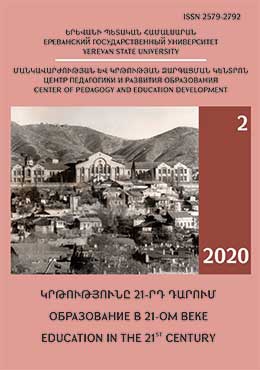THE LEVEL OF AWARENESS OF EDUCATORS AND TEACHERS OF A SPECIALIZED ORPHANAGE IN THE ISSUES OF DEVELOPING SELF-CARE SKILLS TO CHILDREN WITH SEVERE MENTAL RETARDATION
DOI:
https://doi.org/10.46991/educ-21st-century.v2i4.10908Keywords:
children with a severe degree of mental retardation, self- service, educators, teachers, level of development, specialized OrphanageAbstract
The article presents the results of a study of the level of awareness of educators and teachers
of a specialized orphanage about the development of self-care skills in various fields of activity of
children with severe mental retardation.
The surveys, interviews and questionnaires have shown that the overwhelming majority
(87.2%) of the interviewed specialists consider it important to form and develop the skills and
abilities of self-care in children with severe mental retardation in a specialized orphanage. On the
other hand, only 52.3% of interviewees believe that they have a sufficient level of awareness in the
issues studied, 69.2% of the surveyed educators and teachers are not familiar in practice with the
special methodological literature and the work experience of leading specialists about the
development of self-care in this group of children. Therefore, in the practice of educating the skills
and abilities of self-care skills in various fields of activity while working with children, the
interviewed educators and special teachers rely on personal experience and knowledge, but not on
modern methodological developments and the advanced experience of leading specialists.
The results of this research made it possible to determine the main directions of
organizational works for expanding the level and awareness, the acquisition of theoretical
knowledge and practical skills and abilities by educators and teachers of a specialized orphanage
148
aimed at the formation and development of self-care skills of children with a severe mental
retardation.
References
Ազարյան Ռ. Ն., Մտավոր զարգացման խանգարումներ ունեցող երեխաների
կրթադաստիարակչական գործընթացի բովանդակությունն ու առանձնահատկություն-
ները: Հատուկ մանկավարժություն, դասագիրք մանկավարժական բուհերի ուսանողնե-
րի համար, Երևան, 2016, էջ 190-229:
Азатян Т. Ю., Развитие пространственной ориентировки у умственно отсталых
детей. Монография, Ереван, 2013, 178 с.
Дети с нарушениями интеллектуального развития // В кн. В. А. Титова
«Дефектология» конспект лекций, М., 2014, с. 249-260.
Исаев А. Н., Умственная отсталость у детей и подростков, Санкт-Петербург, 2003,
с.
Маллер А. Р., Цикото В., Воспитание и обучение детей с тяжелой интеллектуаль-
ной недостаточностью. Учебное пособие для студентов высших педагогических учебных
заведений, М., 2003, 315 с.
Поваляева М. А., Коррекционная педагогика. Взаимодействие специалистов.-
Ростов-на -Дону, Изд-во «Феникс», 2002, с. 153-168.
Саркисян А. С., Изучение практики воспитания самообслуживания у детей с
легкойи умеренной степенью умственной отсталости в условиях школьного обучения.// В
журнале «Педагогическая мысль», Ереван, 2018, N2, с. 68-73.
Саруханян К. А., Развитие умений и навыков самообслуживания у учащихся спе-
циальной (вспомогательной) школы // «Педагогическая мысль», Ереван, 2006, N 3-4, с. 168-
Энциклопедия специального образования./ Под редакцией Р. Н. Азаряна, Ереван,
, с. 312.
Юшкова Е. Ю., Трудоспособность как одна из категорий ограниченной
жизнедеятельности при олигофрении в зависимости от типа дефекта//Медико-социальная
экспертиза и реабилитация, М.,1999, N3, с. 14-17.
Яйлоян А. В., Баласанян Г. А., Клинико-психолого-педагогическая характеристика
умственной отсталости //Международный научно-методический рецензированный журнал.
«Образование в XXI веке», Ереван, 2020, N1(3), с. 96-100.
Downloads
Published
How to Cite
Issue
Section
License

This work is licensed under a Creative Commons Attribution-NonCommercial 4.0 International License.

